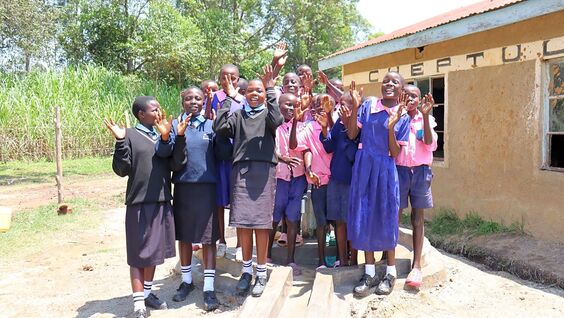Cheptuli Primary School
Project Complete!
Nearby community members rely on sugarcane farming as their primary source of income. Some members are casual laborers at the Butali Sugar Factory. The 668 students and staff of Cheptuli Primary School struggle to access sufficient water to meet their basic needs. If worrying about their daily water needs wasn't enough, their water source options pose significant safety risks.
Field Officer Mildred Mhoba shared, "Pupils in this school fetch water in a hand-dug well on the compound. The water point is seasonal; thus, [it] goes dry during [the] dry season. This forces pupils to find water in the nearby compounds or go to a passing stream to fetch water.The risk of children being injured while on the way either among themselves or strangers, is high."
Mildred continued to share the perils the students of the Cheptuli Primary School face. She said that though they have access to a hand-dug well with a cover, they are at risk of falling in or getting injured. "Accessibility is a challenge due to [the] large cover that could cause accidents. The well appears slippery after drawing water due to the water that covers the drawing area," she continued.
Staff also worries about how their current situation affects their student's futures. So much time is wasted searching, waiting, and collecting water that too much classroom time is lost.
58-year-old Teacher Dickson Kasit, seen below, shared his concerns. "I had [a] rough time trying to get the pupils in the classes for evening lessons. The scenario is created by a lot of wasted time finding water. The water is available during [the] rainy season in the well and [in the] neighborhood, but the quality is poor. The accessibility is also a challenge as the well is risky for my students because chances of causing accidents are so high."
There aren't enough hours daily to give the students a well-rounded experience. There's not enough time for playing or learning, which are both crucial aspects of children's development.
10-year-old Margaret Y. shared, "The water [that] we fetch [is] dirty from the stream. In the evening, when we fetch water, some people's [animals] graze uphill, making the water dirty. In the morning, it is hard to fetch water at [the] well for [the] school due to [the] short time allocated for that and [over] crowding."
Installing a new well will allow students to safely and easily collect all the water they need for their school day. Classroom time will no longer be lost; children like Margaret can rediscover their childhoods through play. Teachers like Dickson can teach all their lessons without fear of students getting injured or missing out on vital education. Students will have a chance at a brighter future.
We conducted a hydrogeological survey at this school and the results indicated the water table beneath it is an ideal candidate for a borehole well. Due to a borehole well's unique ability to tap into a safe, year-round water column, it will be poised to serve all of the water needs for this school's large population, even through the dry months.
The student health club will oversee the two new handwashing stations we will provide, and make sure they are kept clean and in working condition. The club leaders will fill the handwashing stations with water daily and make sure they are always supplied with a cleaning agent such as soap or ash.
We will construct two triple-door latrine blocks using local materials that the school will help gather. Three doors will serve the girls and three doors will serve the boys. All of these new latrines will have cement floors that are designed to be easy to use and to clean. And with a borehole right on school property, there should be enough water to keep them clean.
Training on Health, Hygiene, COVID-19, and More
We will hold a one-day intensive training session with students, teachers, and parents. This training will cover a wide range of topics including COVID-19 symptoms, transmission routes, and prevention; personal and environmental hygiene; and the operation and maintenance of the borehole, latrines, and handwashing stations. There will be a special emphasis on handwashing.
H2O for Life partners with experienced NGO organizations around the world that build and support clean water, sanitation, and hygiene education projects in schools. These NGO partners cover half the total cost of every project funded through H2O for Life.
When students raise money for a project, 90% of the funds go directly to the project, and 10% supports the work that makes the project possible. This includes choosing trusted partners, managing funds responsibly, checking on projects, and reporting back so students can see the impact of their work.
This helps ensure every project is done well, stays sustainable, and truly changes lives.
In rare situations, we reserve the right to reallocate funds to alternate project(s).
Questions? Ask us at 651-756-7577 or info@h2oforlifeschools.org.



















